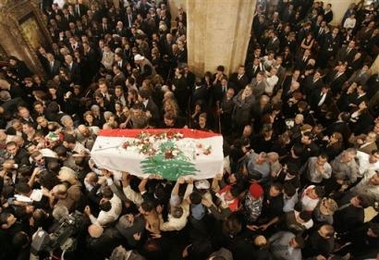 Beirut, 14 Dec. (AKI) – Nineteen-year-old Samer Qays, on Wednesday refused to join the thousands who on turned out to pay their last respects to murdered anti-Syrian politician Gibran Tueni. While Beirut’s Christian districts came to a standstill for the funeral procession, life in the city’s eastern, mostly Hezbollah dominated areas, like Qays’s neighbourhood Haret Hreik, went on as usual. "Joining the procession today means believing the lies fabricated by the Israelis and the Americans," said Qays.
Beirut, 14 Dec. (AKI) – Nineteen-year-old Samer Qays, on Wednesday refused to join the thousands who on turned out to pay their last respects to murdered anti-Syrian politician Gibran Tueni. While Beirut’s Christian districts came to a standstill for the funeral procession, life in the city’s eastern, mostly Hezbollah dominated areas, like Qays’s neighbourhood Haret Hreik, went on as usual. "Joining the procession today means believing the lies fabricated by the Israelis and the Americans," said Qays.
"Our martyrs are not those who work for the Americans," he said, pointing to the photographs of Hezbollah fighters killed in clashes with the Israeli army. "Syria has nothing to do with the attack against that journalist (Tueni), it is Israel that killed him."Sharing this view is Abu Abbas, 67, a Shiite Muslim jeweller, whose shop is situated in the main street of Ghbeiri, a district near to Haret Hreik. "Israel is behind all this, there is no doubt on that," says Abu Abbas, adding that it is the "Israelis who want to control Lebanon," and not the Syrians. But another Ghbeir resident, Wassim al-Utr, 35, disagrees. "I think it was the Syrians [who killed Tueni]. Syria will not leave the country (Lebanon) without leaving it in flames".
Falafel vendor, Yusuf Kradiye, 31, a Sunni Muslim admits he does not know for certain who was behind the bomb attack that killed Tueni on Monday. "There are many who could profit from the attack. Maybe the Syrians, but also others. After all something seems wrong. It would be stupid for Syria to kill like this and leave its signature all over the place."
Some people chose to give more practical and less political reasons for not turning out with those laying Tueni to rest.
"How can I close my shop when we have been in an economic crisis for months? I work 14 hours a day and it’s still not enough," said Yusuf Kradiyye.
Tueni was killed together with his driver and bystander when a bomb exploded in a Christian suburb of Beirut on Monday, the third political murder since former Prime Minister Rafik Hariri was assassinated in February.
The 48-year-old Tueni, was known for his scathing criticism of Syria’s meddling in Lebanese politics, which he frequently denounced from the editorial pages of his an-Nahar newspaper, Lebanon’s leading daily. Tueni recently moved to Paris after revealing that he had received death threats and believed he was on a hit-list. He was back in Beirut this week for what was meant to be a short visit.
Many Lebanese politicians have blamed Syria for Tueni’s murder, but Damascus has denied any involvement.



